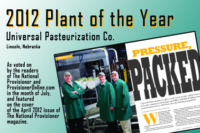Cover Story
Universal Pasteurization Co.: Big-bang theory
Universal Pasteurization Co. continues to expand quickly and aggressively, with no signs of slowing down.

The executive team of Universal Pasteurization Co. — (left to right) Curt Roberts, Mark Duffy, Chris Voudouris, Bill Cook and Jeff Barnard — stand outside the company’s Villa Rica, Ga., processing facility.
Photos by Andy Hanacek


Photos by Andy Hanacek

Photos by Andy Hanacek




One key catalyst in the movie “The Shawshank Redemption” revolves around the buildup of pressure over time, often forcing extreme outcomes to relieve that pressure. The high-pressure processing (HPP) segment of the industry is no stranger to the concept: apply enough pressure over enough time to destabilize and ultimately kill dangerous or undesirable pathogens.
The application of pressure over time also influences the business world, and Lincoln, Neb.-based Universal Pasteurization Co. has demonstrated that with a bang over the last four years. When the company was last featured in The National Provisioner in 2012, it was a small, one-facility company offering HPP and other value-added services to food processors.
As the popularity of HPP grew, the positive pressure blasted Universal outward, making it the self-proclaimed “largest HPP service provider in the world” — with four facilities featuring nearly one million square feet of refrigerated floorspace across the United States, an enhanced executive team and an appetite for further expansion across the U.S. and beyond.
Mark Duffy, CEO of Universal, explains that appetite isn’t driven simply by a bottom-line goal. The executive team additions that have been made to the legacy Universal leadership feature a passion for the underlying cause for which the company fights every day.
“It is very intentional when we talk about our greater cause of food safety,” he says. “We make our company’s professional purpose personal [that] we can help ensure the safety and quality of products companies bring to market, and that’s a really compelling message that we love talking about.
“As much pride as we have in our service record with our customers and the various value-added services we offer (such as logistics support, tempering, kitting, etc.), we have as much pride in knowing what we do helps ensure food safety,” Duffy adds. That latent passion, combined with investments in Universal’s capacity and footprint, has catapulted its expansion. To support Jeff Barnard, president, and Curt Roberts, COO, (both featured in the 2012 story) and the rest of the Universal legacy talent, the company acquired the Villa Rica, Ga., facility in 2013, GL Foods’ facility in Coppell, Texas, in 2014, and the Malvern, Pa., facility in 2015.
The executive puzzle was completed with the hiring of Chris Voudouris, CFO, in 2013; Bill Cook, vice president of sales, in 2014; and Duffy in January 2016. It’s a team that has coalesced at light speed.
“The conviction that we have to helping companies be successful is why we’re here,” Duffy says. “We know what we do makes a difference, and to be part of a business that can bring this solution to the marketplace, surrounded by people who have that same conviction, passion and sense of purpose, that’s really meaningful and rewarding.”
Duffy gets physically energized when talking about why he joined Universal: “Being part of a significantly growing industry, joining a great team with deep focus on service and customers, and being part of the leading company in the HPP industry made the decision very easy.”
Tidal wave
The Universal team believes HPP as a food-safety solution has extensive room to grow, and the company is doing all it can to push harder. Much of the work the sales team does on a daily basis revolves around education of customers and the industry.
“We believe HPP is still unknown to a lot of people,” Barnard says. “Bill [Cook], myself and the entire sales team keep evangelizing and getting the word out about what HPP can do for shelf life, brand protection and the greater cause of food safety.”
Although the HPP service-provider network or tolling network is growing significantly, some food processors have investigated and adopted HPP at a faster rate in the last five or six years, and a few have invested in their own HPP machines. For an HPP service provider such as Universal, such a development might be worrisome. But Universal views the growth and accessibility of HPP as a positive nod toward its relevance. It’s the old adage: A rising tide lifts all ships, Duffy says.
“We are proud of the fact that when you look at our facilities, it is like being supported by a fleet of ships: We have Lincoln, Neb., Villa Rica, Malvern and Coppell as the current fleet,” he says. “Our fleet will continue to expand in number and rise as the industry continues to rise.”
Companies that don’t have the capital or space to invest in the infrastructure required to house the HPP process aren’t vanishing, and they remain ideal partners for Universal. Furthermore, Cook says, some manufacturers simply aren’t interested in bringing a batch-process system in-house.
“For the larger manufacturers, it’s very difficult to streamline this, because their speed of manufacturing is much faster than the HPP process,” he explains. “Most of them really have figured out how to get the most efficiency out of their buildings, and this is still a slow process, which deters [some manufacturers from investing in their own machines].”
In many cases, larger processors who have the means to install an HPP machine still require the services that Universal provides for redundancy and business continuity, Barnard says.
“The struggle for someone sitting at one of the big five food-processing companies is, they have multiple facilities but may only be installing one vessel, so where do they put it?” he says. “So, we become a solution for the facilities that don’t get the machine.”
Universal is quick to commend the equipment manufacturers for their efforts to continuously improve the performance and life of the machines. Roberts says speed is the challenge and Universal’s focus is on process improvements that can deliver their customers a lower cost to operate.
“That’s the name of the game: how much can you get in the basket in one batch and then how quickly can you get it through the process,” he explains. “[Suppliers] have done some modular designs, where they can add intensifier pumps and stage them in, to get you that faster time to pressure.”
Expanding the universe
Duffy minces no words when describing Universal’s aspirations moving forward.
“That greater cause we talked about, it’s a global commitment — we are very focused on expanding our footprint, and we’re not just talking about the United States,” he says. “Our bigger picture is a global picture.”
On the more local level, however, Universal will focus on filling its processing floorspace — and then expand as needed. Voudouris says Villa Rica has room for at least two more HPP machines, while Lincoln can fit an additional machine in its current layout. Malvern, on the other hand, has room for six or seven additional vessels.
“When we went into Malvern, we went big, because it gives us the greatest bandwidth and flexibility to service our customers best,” Voudouris says.
Both Villa Rica and Malvern were “multimillion-dollar investments and renovations before any equipment was purchased,” Voudouris adds. In the former GL Foods’ Coppell facility, Universal has filled its useable footprint, and Duffy says the company is on the prowl for a new location.
“First and foremost, we are in the Dallas/Fort Worth area very intentionally, and we’re very committed to that region,” he says. “We will be there, in a new location, sometime in the next year or so.”
When looking beyond the next year, Duffy cites the growth trajectory that Universal has been on for the last four to five years as a leading indicator of the future. A growth mindset, he says, is a common denominator for the entire management team. That mindset extends to the entire team, Barnard says, as Universal has been able to emulate a customer-centric culture born in the legacy Lincoln facility throughout the company.
“Our associates understand if we don’t offer customers top service, we have a problem,” he explains. “And they are doing a great job with servicing customers well.”
Universal knows it’s going to grow domestically, Duffy says (it was actively looking to add a fifth location at presstime). Success will hinge upon the pace of new customers coming on board to keep up with the infrastructural growth. As the company shares its story, it will also continue to support the greater food-safety cause for the industry at large.
“As we said before, we are the largest HPP service provider in the world, and our intention is to preserve that position in the global marketplace,” Duffy concludes, “earning the right to help customers with their commitment to food safety, quality and cleaner-label products.” NP
Looking for a reprint of this article?
From high-res PDFs to custom plaques, order your copy today!






